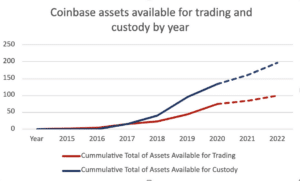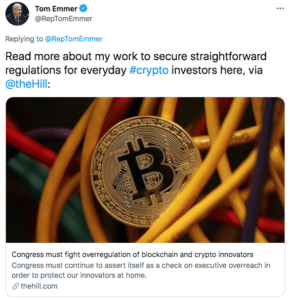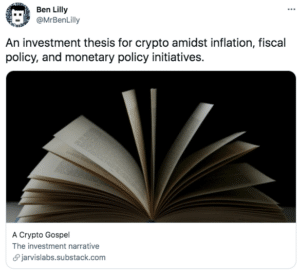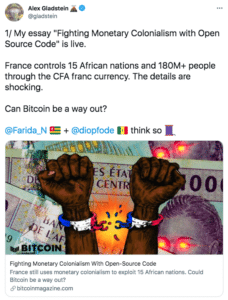June 29, 2021 / Unchained Daily / Laura Shin
Daily Bits ✍️✍️✍️
-
Ark Invest is filing for a bitcoin ETF.
-
Ethereum investment products hit $50M in outflows over the past week — the largest on record.
-
Bitcoin’s hashrate dropped to 94 exa (or quintillion) hashes per second, a number not seen since May 2020.
-
Compound Labs has launched an institutional DeFi product dubbed Compound Treasury.
-
Mexican financial authorities do not consider crypto assets currency under current laws.
-
Tidal, a music streaming service, is interested in exploring NFTs as a new way to compensate artists.
-
Polygon stablecoin SafeDollar was hit by an exploit and dropped to zero.
-
Crypto.com (disclosure: a current sponsor of my shows) and Circle announced a partnership that will give more than 10M customers access to funds settled in USDC.
- Crypto investments in India grew 19,900% over the past year.
What Do You Meme?
What’s Poppin’?
Part 1: The US Has CBDC FOMO
In a speech, yesterday titled “Parachute Pants and Central Bank Money,” Randal K. Quarles, the Federal Reserve’s vice chair for supervision, said that the fever pitch for a US-issued CBDC has become outright FOMO.
Quarles points to America’s “susceptibility to boosterism and fear of missing out” as a character trait that has “sometimes led to a mass suspension of our critical thinking and to occasionally impetuous, deluded crazes or fads,” like parachute pants.
Beyond the parachute pants illustration, Quarles emphasized three points:
- The US dollar payment system is working just fine. Mr. Quarles is skeptical that a CBDC is necessary for a country where the “general public already transacts mostly in digital dollars.” (He’s talking about the kind that sometimes take five days to move between banks.) Furthermore, he does not believe the Fed has the legal authority to issue “CBDC models without legislation” being further fleshed out.
- The benefits of creating a CBDC are unclear when foreign CBDCs or other crypto assets are yet to prove competitive to the dollar. Quarles is not worried about a foreign CBDC or stablecoin overtaking the dollar as the world’s dominant currency. He said, “It seems unlikely, however, that the dollar’s status as a global reserve currency, or the dollar’s role as the dominant currency in international financial transactions, will be threatened by a foreign CBDC.”
He also noted that the US should not fear stablecoins, positing that a “US dollar stablecoin might support the role of the dollar in the global economy.” On “Bitcoin and its ilk,” Quarles argued that such assets would “remain a risky and speculative investment rather than a revolutionary means of payment, and they are therefore highly unlikely to affect the role of the U.S. dollar or require a response with a CBDC.”
- A potential CBDC may pose considerable risk to the Fed and US alike. Quarles says it could “be expensive and difficult to manage,” as the Fed would, in essence, have to act as a retail bank to the general public. He also touched on the challenging balance between creating a CBDC that would respect an individual’s privacy while also minimizing the risk of money laundering.
Read the full speech here.
Part 2: Coinbase Wants to List Every Token (That Meets Its Standards)
Coinbase CEO Brian Armstrong took to Twitter to explain how Coinbase handles new asset listings on its platform.
His tweet came shortly after the exchange added Polkadot, Shiba Inu, and Dogecoin within one month.
According to Decrypt, Coinbase has aggressively picked up the pace of its asset offerings. For context, the exchange added 21 new assets in 2020. Halfway through 2021, the company has already added 29 new tokens. Coinbase’s custody division has also expanded, announcing support for 74 additional tokens — more than doubling the number of assets available to custody on the platform in just six months.
Source Decrypt
Armstrong’s Tweet thread made it clear that Coinbase is “asset agnostic” and believes in a free market with consumer choice. He also noted that a Coinbase listing is not an endorsement of a token. Instead, it’s just the acknowledgment that a token hit the exchange’s minimum listing standards.
“Do your own research and exercise good judgment,” Armstrong warned.
Recommended Reads
- Congressman Tom Emmer on why Congress must fight overregulation of blockchain and crypto innovation:
- Ben Lilly’s investment thesis for crypto is based on one chart… U.S. 30 year bond yields:
- Alex Gladstein on how Bitcoin could be used to fight monetary colonialism:
On The Pod…
Ethereum’s EIP-1559 Will Solve Some Problems But Big Ones Will Remain

Taylor Monahan, CEO of MyCrypto, and Tim Beiko, Ethereum Foundation core-dev facilitator, discuss the upcoming upgrade to the Ethereum network, EIP 1559. Show highlights:
-
why Tim believes EIP 1559 is necessary
-
what narrative is driving EIP 1559
-
what problems the network upgrade will solve
-
how Ethereum transactions/fees work
-
whether gas prices are correlated with ETH/USD
-
the 3 main protocol changes that EIP 1559 proposes
-
why Taylor, as the CEO of a wallet provider, is wary of EIP 1559
-
how EIP 1559 will affect Ethereum’s block size
-
what changes wallet providers are considering due to EIP 1559
-
whether ‘Black Swan’ events will be more or less likely after the network upgrade
-
how EIP 1559 will affect miners
-
whether Tim or Taylor believes that miners could fork Ethereum to stop EIP 1559
-
how EIP 1559 will change the state of miner extractable value (MEV)
-
how Taylor and Tim feel about the Ethereum as sound money narrative in light of EIP 1559
-
when EIP 1559 will go live
Book Update
My book, The Cryptopians: Idealism, Greed, Lies, and the Making of the First Big Cryptocurrency Craze, is now available for pre-order now.
The book, which is all about Ethereum and the 2017 ICO mania, comes out Nov. 2nd. Pre-order it today!
You can purchase it here: http://bit.ly/cryptopians









